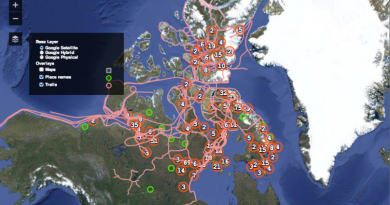Inuit and Oil: To Drill, Or Not to Drill
Two years ago, at the Northern Research Forum, I had the pleasure of meeting Patricia Cochran, the knowledgeable and charismatic former President of ICC. While she acknowledged that different Inuit groups had different views on the (then recent) US designation of the polar bear as an endangered species, she stated that one thing the Inuit agreed on was their opposition to offshore oil and gas drilling in the Arctic. The Inuit, of course, are a marine people whose traditional way-of-life is greatly dependent on the health of Arctic waters. Together with climate change, the prospect of an oil spill in the Arctic poses the greatest threat to the northern environment.
Fast forward to the recent General Assembly of the Inuit Circumpolar Conference, held in Nuuk, Greenland, last month. The sensitive topic of oil drilling was on the agenda, with some delegates warning against the potential damage such drilling could engender, and others arguing that the economic development generated by such projects is integral to Inuit goals of self-sufficiency. In their Declaration, the Assembly ultimately decided to:
Instruct ICC, as a matter of urgency, to plan and facilitate an Inuit leaders’ summit on resource development with the aim of developing a common circumpolar Inuit position on environmental, economic, social and cultural assessment processes and, as a first order of business, raise funds for such a summit.
The catalyst for these discussions seems to be the Greenlandic decision to begin drilling this Summer. The government there sees the drilling of oil and gas as an opportunity to generate revenues in order to reduce its dependence on Denmark. To that end, it has granted Cairn Energy licenses to drill off its Western coast, in the Davis Strait.
Other Inuit have been vocal against drilling in the Arctic. Akkaluq Lynge, the new Greenlandic President of ICC, has been public about his opposition to drilling. And in the wake of the BP spill in the Gulf of Mexico, Mary Simon of ITK, the umbrella organization representing Canadian Inuit, called for an ”an immediate pause or … time-out‚ on drilling in the Beaufort Sea in order to take stock of environmental risks.”
Offshore drilling isn’t the only issue stirring up debate. The Inuit position on uranium mining has also softened. A proposed uranium mine near Baker Lake, Nunavut, is now under review despite historical resistance by Inuit to uranium mining. And a three year moratorium on uranium mining imposed by Labrador’s Nunatsiavut government in 2008 was challenged last week by residents in Postville, Labrador, saying it has created economic hardship in the community.
Arctic indigenous differences over whether to move forward on economic development projects aren’t just about the environment either. The development of the Mackenzie Gas pipeline is being delayed by the Dehcho, of southern NWT, who want to settle their land claims before moving forward with the project. Inuvialuit, Gwich’in and Sahtu have already endorsed the project and are frustrated by the Dehcho’s resistance, with Inuvialuit leader and former N.W.T. premier Nellie Cournoyea making the somewhat ironic comment that “I don’t believe it’s in the Canadian interest that one group, or part of one group, can hold up the economic opportunities of a lot of other people.”
There are no easy answers to any of these challenges. But they are instructive. First, they belie the southern assumption that indigenous peoples, and Inuit in particular, act towards homogenous interests and share a single voice. In contrast, they are a diverse group with complex problems that must be settled through debate, negotiation and compromise – as with any group. Second, it challenges the romantic notions those of us in the South often have about Inuit as perpetual defenders of the environment. Like people everywhere, they struggle to find a balance between cultural, economic and environmental interests. Finally, it points to the need for stronger environmental regulation and monitoring. Everyone is in favour of economic development, especially as it promotes strong, self-sufficient northern communities. And everyone wants it done in a way that minimizes the potential for environmental destruction. Research, consultation, and an adherence to sensible regulations are necessary for the kind of sustainable development that is needed to achieve these goals.


